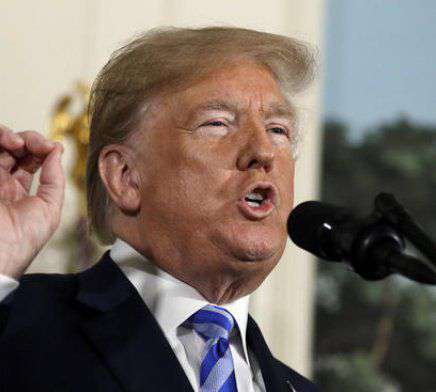In a surprising overture to China, President Donald Trump says he would help a Chinese telecommunications company get “back into business,” saying too many jobs in China are at stake after the U.S. government cut off access to its American suppliers.
At issue is the Commerce Department’s move last month to block the ZTE Corp., a major supplier of telecoms networks and smartphones based in southern China, from importing American components for seven years.
The US accused ZTE of misleading American regulators after it settled charges of violating sanctions against North Korea and Iran. The case dates to before Trump took office in January 2007 but the Commerce Department’s decision came amid worsening trade tensions between the US and China centered on technology-related intellectual property.
Trump’s unexpected announcement Sunday came as the two countries prepared to continue trade talks in Washington this week. Given his past vows to stop the flow of US jobs to China and crack down on what he says are unfair trade practices, Trump’s tweet of concern about Chinese jobs was something of a backflip.
“A reversal of the ZTE decision could temporarily tamp down trade tensions by allowing the Chinese to make concessions to the U.S. without losing face,” said Eswar Prasad, a professor of trade policy at Cornell University.
“Trump may have recognized that backing off on ZTE clears the path for him to claim at least a partial victory in the US-China trade dispute based on the concessions the Chinese seem prepared to offer.” ZTE, which has more than 70,000 employees and has supplied networks or equipment to some of the world’s biggest telecoms companies, said in early May that it had halted its main operations as a result of the department’s “denial order.”
Trump, who has taken a hard line on trade and technology issues with Beijing, tweeted that he and Chinese leader Xi Jinping “are working together to give massive Chinese phone company, ZTE, a way to get back into business, fast.
Too many jobs in China lost. Commerce Department has been instructed to get it done!” Expanding on Trump’s message, White House deputy press secretary Lindsay Walters said in a statement, “The President’s tweet underscores the importance of a free, fair, balanced, and mutually beneficial economic, trade and investment relationship between the United States and China.”
It was not exactly clear what Trump was proposing for ZTE, or whether it would involve rolling back the Commerce Department’s decision. The White House deferred to the Commerce Department on any specific questions relating to ongoing regulator action. In a later tweet, Trump suggested the U.S. and China were moving forward on the trade negotiations, but it was not clear how the ZTE case would fit into the bigger picture.
“I’ve never seen a president step in and reverse an agency decision like this. It’s not clear, of course, if he’s planning to really reverse it or think of a solution in a larger context, but it is something that is just out of the norm,” said Amanda DeBusk, the chair of the international trade department at the New York City-based law firm Hughes Hubbard & Reed.








